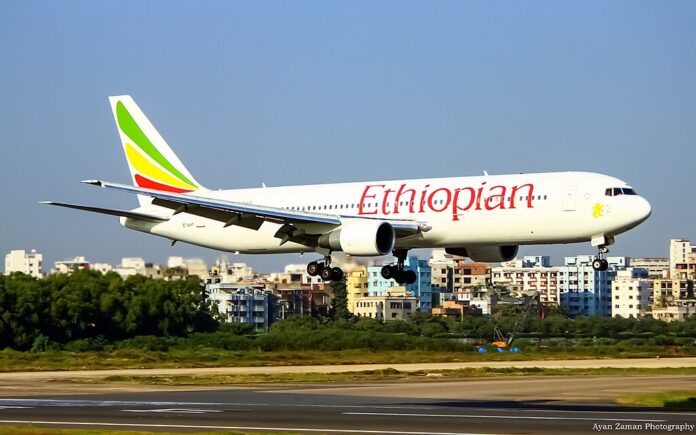Peta alleges Ethiopian Airlines’ involvement in a controversial monkey transport operation to American labs, sparking outcry from animal rights advocates
Ethiopian Airlines, Africa’s largest carrier, is under fire from animal rights group PETA for allegedly facilitating the transport of endangered monkeys from Ethiopia to the United States for use in animal testing. According to PETA, the airline is linked to what it describes as an illicit international monkey-smuggling ring.
PETA claims that Ethiopian Airlines recently transported 250 long-tailed macaques to the US, where they were subsequently delivered to laboratories for research purposes. Despite previous assertions from the airline that it does not transport monkeys, PETA contests this statement, alleging that the primates endure harsh conditions during their journey, confined in cramped wooden crates amidst unsanitary conditions.
Embed from Getty ImagesThe controversy deepens with allegations that Ethiopian Airlines has been cited twice by the US Department of Agriculture in 2023 for violations related to monkey transportation. One incident involved the shipment of 584 monkeys without required health certificates, while another citation cited the airline for inadequate care instructions provided to ground crews handling the animals.
PETA further accuses the airline of negligence during the unloading process in Georgia, where 336 monkeys were allegedly left exposed to sweltering 85-degree heat for over ninety minutes, raising concerns about animal welfare standards and compliance with international transport regulations.
Most of these monkeys originate from Mauritius, a key source for animals used in laboratory research, although recent incidents have strained relations between animal testing facilities and airlines willing to facilitate such transports. In a notable example, Kenya Airways ceased transporting long-tailed macaques following a high-profile accident involving escaped monkeys during transit to a US quarantine facility.
PETA’s campaign against airline involvement in animal testing extends beyond Ethiopian Airlines, having previously targeted Scandinavian airline SAS over similar allegations involving the transport of dogs for laboratory purposes. Many international carriers and cargo companies have opted against transporting animals for research, citing ethical concerns and public backlash.
Analysis:
Political Perspective: Politically, the controversy underscores broader debates over animal rights and the ethical implications of scientific research practices. Ethiopian Airlines’ alleged involvement in facilitating the transport of endangered species raises questions about regulatory oversight and international cooperation in preventing wildlife trafficking and animal exploitation.
Social Perspective: From a societal standpoint, the outcry against Ethiopian Airlines reflects growing public sensitivity towards animal welfare and corporate responsibility. The issue resonates with global audiences concerned about the treatment of animals used in scientific experiments, prompting calls for stricter regulations and ethical considerations in transportation and research practices.
Economic Perspective: Economically, the fallout could impact Ethiopian Airlines’ reputation and operations, particularly if the allegations lead to regulatory sanctions or public boycotts. The airline’s involvement in controversial practices risks alienating environmentally conscious consumers and ethical investors, potentially affecting its market competitiveness and financial performance.
Environmental Perspective: Environmentally, the transport of endangered species for laboratory testing contributes to biodiversity concerns and ethical dilemmas. The exploitation of wildlife populations for scientific experimentation raises alarms about conservation efforts and sustainable practices in research and development sectors globally.
Legal Perspective: Legally, Ethiopian Airlines may face scrutiny and potential legal consequences if found in violation of international animal transport regulations or implicated in illicit wildlife trafficking activities. Regulatory bodies and advocacy groups could pursue legal actions to enforce compliance and accountability in animal welfare standards across international borders.
